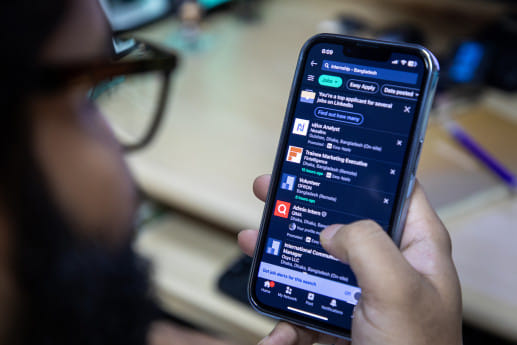A beginner’s guide to finding and applying for jobs on LinkedIn

Finding, applying to, and securing jobs via LinkedIn doesn't have to be difficult. In fact, compared to your usual job posting sites, LinkedIn has a lot more to offer in terms of opportunities, especially if you're looking for freelance work or remote jobs.
That being said, job hunting on LinkedIn can feel tiring and occasionally pointless, particularly for those who are new to the platform or don't use it that often. However, knowing how to efficiently look for and apply to jobs can help you make the most of this platform for your professional goals.
The most common way to look for jobs on LinkedIn is through its dedicated job searching feature. Simply mention the type of job or position you're looking for and your preferred working location, and LinkedIn will show you all the jobs that are available for your search query.
Like many other job posting sites, LinkedIn lets you filter these search results to a great extent. One filter that is very important to utilise here is "Date Posted".
"Date Posted" refers to how long back the job was posted on the platform or when the position opened up. When searching for jobs, first look for the ones that were posted in the last 24 hours or one week. Since these jobs have only been around for a short while, there's a chance that they haven't received hundreds of applications yet.
If you can't find anything that's to your liking, you can extend the search results to include all the jobs posted in the last month. While this option will show you more job openings, there's a good chance that a lot of these vacancies are already overwhelmed with applications. Plus, some of these jobs may have already shortlisted candidates for interview or even hire. Hence, even if these job posts show that they are recruiting till a certain deadline, they might not even notice your application.
Apart from the job search option on LinkedIn, joining different job posting groups on the platform is also helpful. The best thing about these groups is that you'll find dedicated groups for different professions.
For instance, if you're a content writer, you should join groups where members share recruitment posts specifically for content writing and other relevant positions. Similarly, you'll find groups for jobs related to programming, graphic design, marketing, etc. Basically, irrespective of the field you're working in, be rest assured that there's a group on LinkedIn that will specifically have job postings related to the field. You just have to search for these groups, and the search feature works fine for this purpose. On LinkedIn's search bar, use keywords and phrases that include your field's name along with words like "jobs", "community", etc.
Lastly, and, in my opinion, the best way to find jobs on LinkedIn is through connecting with people. This approach is especially useful if you're looking for freelance or remote work.
Don't hesitate to connect with people from your field no matter where they are based. Ideally, you should be looking for people who work as recruiters or at their respective company's talent acquisition or HR team. Again, use the search option on LinkedIn to your advantage for this. Simply search for terms like "talent acquisition", "recruiter", etc. along with keywords related to your field of interest.
You should also connect with people who work in similar positions as you. This is because these people themselves might occasionally be looking for jobs on LinkedIn. For that, they will occasionally react to or comment on various recruitment posts. When they do that, those recruitment posts will show up on your feed, as long as you are connected or following the people who are engaging with such posts. You can then decide whether or not you want to apply to those jobs.
Having said all this, you must remember that applying via LinkedIn doesn't increase your chances of securing a job, especially if said job is a freelance position or located in a different country with remote working options. One thing that might also frustrate you is that some remote jobs require you to be located in a specific country or region. Of course, this makes no sense, but it shows how the idea of working remotely still varies across the world.
However, this shouldn't discourage you from applying to all these jobs. From my personal experience, as well as that of a few others, I can tell that you might still have a shot at securing jobs outside the country as long as you have the right qualifications. Just make sure your LinkedIn profile and CV is up-to-date and highlights all your skills, qualifications, portfolio, and relevant experiences.
Faisal is the In-Charge of Campus, Rising Stars, and Star Youth.

 For all latest news, follow The Daily Star's Google News channel.
For all latest news, follow The Daily Star's Google News channel.
Comments